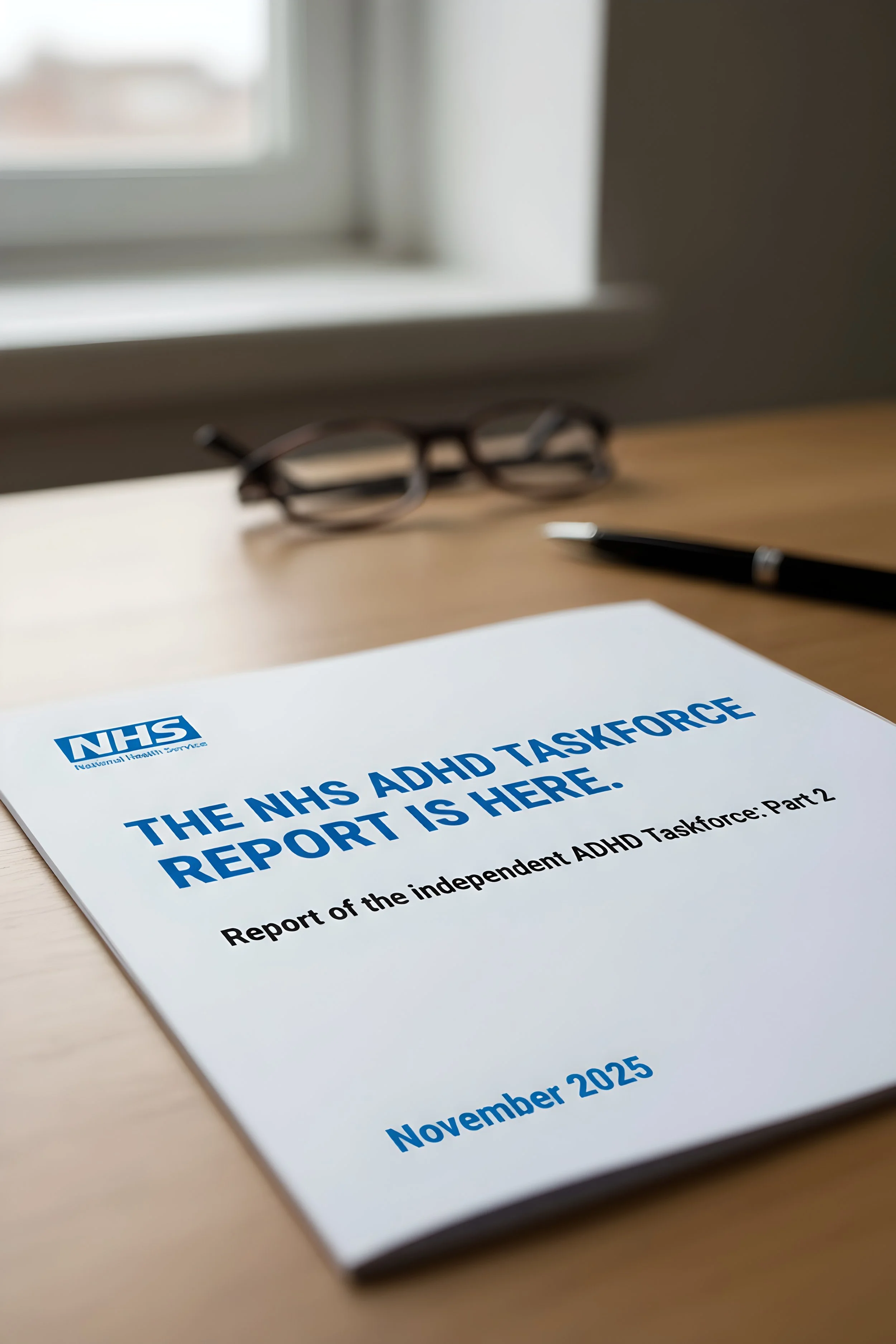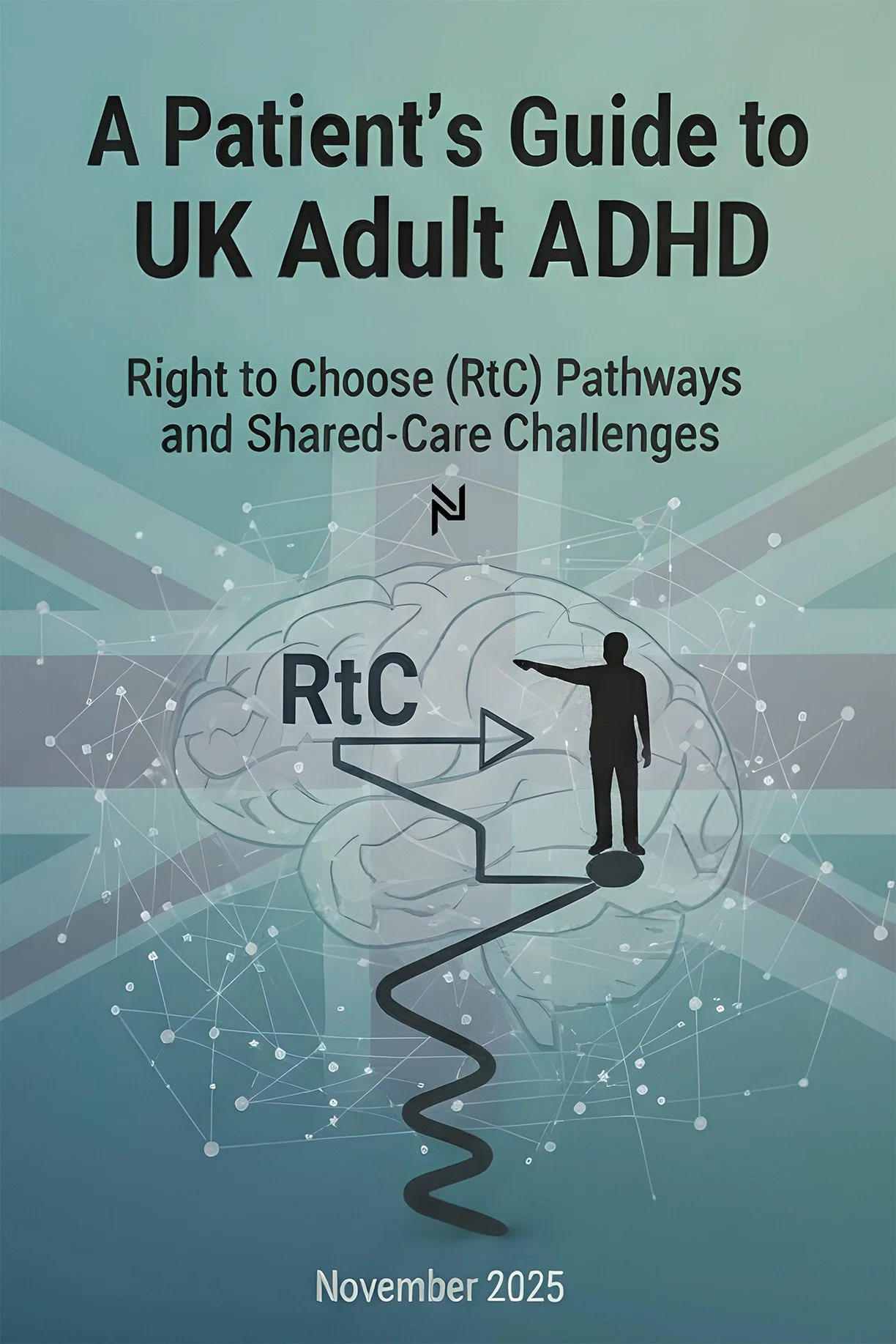ADHD REFORM RADAR 📶

The page is dedicated to monitoring the progress of the NHS ADHD Taskforce
The NHS ADHD TASKFORCE report is out >
New Read >
Click the image to
read the report >
Click below to read the full report
ADHD TASKFORCE
interim report
june 2025 >
TimEline - key moments and expected dates
Neurohaven summary and analysis
neurohaven analysis
june 2025 >
19 Mar 2024 - NHS England press release announces creation of a “cross-sector ADHD Taskforce to boost care for patients in England.” england.nhs.uk
16 May 2024 - Prof Anita Thapar and Joanna Killian named Taskforce co-chairs; Terms-of-Reference promised “within weeks.” digital.nhs.uk
Nov 2024 - First monthly Taskforce meeting (stated in Terms of Reference: “the Taskforce will meet monthly from November 2024”). england.nhs.uk
22 Jan 2025 - Formal Working-Groups (Data, Workforce, Cross-Sector Support) convened (first minutes referenced in ToR appendix – date logged in meeting schedule).
10 Mar 2025 - NHS England blog by Prof Thapar gives first public interim update: needs-based support model, data dashboard, private-diagnosis quality-standards. england.nhs.uk
29 Mar 2025 - ADHD Taskforce Terms of Reference PDF published on NHS England site (file metadata date). england.nhs.uk
29 May 2025 - First national “ADHD Management Information” statistics released (est. 2.498 million people with ADHD; 549 k waiting). digital.nhs.uk
10 Jun 2025 - Westminster Hall debate – Minister Karin Smyth confirms: “Interim findings will be published shortly; final report after summer recess.” england.nhs.uk
Jul 2025 - (expected)Interim Report publication window (Government statement: “this summer”).
Aug–Sep 2025 - (expected)Consultation & stakeholder feedback on interim recommendations (standard NHS practice: 6–8 weeks).
Oct 2025 - (expected)NHS England & DHSC begin drafting implementation framework and funding options while Taskforce finalises text.
Dec 2025 – Jan 2026 - (target)Final Report completed; submitted to NHS England Board and DHSC.
Q1 2026 - (expected)Public release of Final Report plus Government response; Taskforce converts to, or is replaced by, an Implementation/Oversight group or disbands.
Mid-2026 onward - (road-map)Roll-out of service changes, new waiting-time dashboards, and cross-sector pilots; quarterly progress reviews by NHS England and parliamentary scrutiny.
Origins and Context
The NHS ADHD Taskforce emerged in response to mounting national concern over the rapidly growing demand for ADHD diagnosis and treatment services across the UK. Between 2017 and 2023, referrals for ADHD assessment soared—particularly among adults and women, populations historically underdiagnosed. This surge placed unprecedented pressure on NHS mental health services, leading to lengthy waiting lists, inconsistent access to care, and growing criticism from patients, clinicians, and advocacy groups.
Amid widespread media coverage, including BBC Panorama investigations into private ADHD clinics and a surge in public discourse about neurodiversity, the UK Government and NHS England acknowledged the need for a coordinated response.
Formation of the Taskforce (2023)
In late 2023, NHS England announced the formation of a national ADHD Taskforce to investigate and address systemic issues across ADHD care pathways. The announcement followed joint calls from professional bodies like the Royal College of Psychiatrists, the British Psychological Society, and charities such as ADHD UK and ADDISS.
Key aims of the taskforce included:
Mapping the national ADHD care landscape across primary, secondary, and private services.
Examining referral bottlenecks, particularly in Right to Choose (RTC) pathways.
Reviewing prescribing practices and medication safety protocols.
Establishing standardised service models and equitable access principles.
Identifying and eliminating postcode lotteries and service rationing.
Leadership and Stakeholders
The taskforce brought together a wide coalition of experts and stakeholders, including:
Senior NHS commissioners and service designers.
Consultant psychiatrists, GPs, psychologists, and prescribing pharmacists.
Patient representatives and neurodivergent individuals with lived experience.
Representatives from private sector clinics operating under Right to Choose (RTC) frameworks.
Legal and regulatory advisors, particularly around GMC, CQC, and NICE compliance.
Meetings were held under Chatham House Rule to facilitate honest discussion, while working groups focused on access, clinical pathways, digital tools, and public perception.
Initial Challenges
The taskforce faced significant early challenges:
Fragmentation of services between children’s and adult pathways.
Deep confusion around RTC legislation and implementation.
A lack of clear data on ADHD prevalence, waiting times, and outcomes.
Reports of systemic bias, particularly toward adult males, ethnic minorities, and women with inattentive ADHD.
Stigma and misinformation within the medical community, law enforcement, and even government agencies.
Critically, some NHS Trusts began blocking referrals to RTC providers in early 2024, prompting a national backlash and several legal threats, undermining the credibility of the Taskforce's intentions.
Interim Findings & Developments (2024)
In mid-2024, the taskforce published an interim update highlighting:
An estimated 1.5 million undiagnosed ADHD cases in the UK.
Widespread non-compliance with NICE guidelines, particularly regarding adult ADHD.
Evidence that many areas offered no commissioned adult ADHD service at all.
Systemic over-reliance on antidepressants and generic mental health services in lieu of ADHD-specific care.
The report also acknowledged that Right to Choose had become a lifeline for thousands—and restricting it without NHS provision was both ethically and legally problematic.
Despite this, pressure from NHS Trusts, workforce shortages, and prescribing fears led to reduced RTC access in many regions in early 2025. This triggered parliamentary debates and national scrutiny.
Parliamentary Debate & Public Scrutiny (June 2025)
On 10 June 2025, MPs held a Westminster Hall debate specifically addressing ADHD care. MPs from across parties—including Freddie van Mierlo (Liberal Democrats) and Adam Dance (Lib Dem)—expressed concern about:
The postcode lottery of care.
Inadequate support in schools, prisons, and workplaces.
Rising prescription gatekeeping and mislabelling of patients as drug-seeking.
The impact of delayed diagnosis on mental health, employment, and relationships.
The Minister acknowledged the taskforce’s work and committed to delivering a final action plan by autumn 2025.
Where Are We Now? (June 2025)
As of mid-2025:
The taskforce has begun working toward a national ADHD strategy, akin to long-term plans in autism and dementia care.
NHS England has been under pressure to reopen and clarify RTC access, particularly for adult ADHD services.
New training programmes for GPs, pharmacists, and mental health staff are being piloted.
Digital tools to track ADHD care pathways and waiting times are in development.
Concerns remain about bias in medical culture, policing attitudes, and under-recognition of ADHD in women and ethnic minorities.
What’s Next?
The final report from the NHS ADHD Taskforce is expected later in 2025, and may include:
National minimum service standards for ADHD care.
Protected funding streams for adult ADHD services.
Clarified guidance around Right to Choose.
Proposals for integrated care models involving primary and secondary services.
Recommendations to combat discrimination and stigma, including within criminal justice settings.
The NHS ADHD Taskforce HISTORY
New Read >
☎️ NHS ADHD Taskforce & Data
**NHS England – ADHD Taskforce Overview**
Background, remit, membership, timeline.
🔗 https://www.england.nhs.uk/mental-health/taskforces/adhd-taskforce/ btp.police.ukmet.police.uk+2whatdotheyknow.com+2met.police.uk+2**NHS England Blog – Update by Professor Anita Thapar**
Insights on interim findings and cross-sector collaboration.
🔗 https://www.england.nhs.uk/blog/an-update-on-the-work-of-the-adhd-taskforce/**NHS England Press Release – Taskforce Chairs Announced**
Introduces Chair Prof. Thapar and co-chair Joanna Killian.
🔗 https://www.england.nhs.uk/2024/05/adhd-taskforce-chairs-announced/ whatdotheyknow.com+1whatdotheyknow.com+1**NHS Digital – ADHD Data Improvement Plan**
Page explaining monthly data reporting on ADHD referrals and treatment.
🔗 https://digital.nhs.uk/data-and-information/find-data-and-publications/statistical/adhd whatdotheyknow.com+5whatdotheyknow.com+5kent.police.uk+5**Royal College of Psychiatrists – Taskforce Support**
RCPsych’s statement backing the Taskforce.
🔗 https://www.rcpsych.ac.uk/news-and-features/latest-news/detail/2024/05/17/rcpsych-welcomes-adhd-taskforce whatdotheyknow.com+7whatdotheyknow.com+7met.police.uk+7**Aspire Healthcare – Taskforce Subgroup Overview**
Explains operational subgroups and interim timelines.
🔗 https://aspirehealthcare.co.uk/news/nhs-adhd-taskforce-subgroup-updates whatdotheyknow.com
🧮 National ADHD Prevalence & Inequalities
**Ethnicity-Facts-Figures – Adult ADHD Prevalence**
Populational estimate: 3–4% of UK adults have ADHD.
🔗 https://www.ethnicity-facts-figures.service.gov.uk/adult-adhd-prevalence**Northern Ireland Assembly Research – ADHD Report**
UK-wide prevalence overview and contributing factors.
🔗 http://www.niassembly.gov.uk/globalassets/documents/raise/publications/2024/adhd-overview-report.pdf policing.tv**OpenAccessGovernment – Taskforce Coverage**
Overview of strategic goals and service variability.
🔗 https://www.openaccessgovernment.org/nhs-england-adhd-taskforce/ policing.tv
🏛️ Westminster Hall Debate – 10 June 2025
**Hansard – Full Debate Transcript**
Comprehensive record of the 10 June ADHD debate.**Rachel Gilmour MP’s Key Contribution**
Where she calls out police, military and public-service exclusions.
**Minister Karin Smyth’s Response**
Government confirmation of Taskforce findings and planning.
🚓 Policing & Occupational Data
**British Transport Police FOI – ADHD Disclosures**
Only 2 non-probationary constables declared ADHD; none in firearms roles.
🔗 PDF response here: [BTP FOI – ADHD stats] whatdotheyknow.com+3whatdotheyknow.com+3whatdotheyknow.com+3whatdotheyknow.com+2btp.police.uk+2whatdotheyknow.com+2**WhatDoTheyKnow Archive – FOI Request**
Original FOI request details and context.
🔗 https://www.whatdotheyknow.com/request/number_of_serving_police_officer_4?unfold=1 whatdotheyknow.com+9whatdotheyknow.com+9whatdotheyknow.com+9whatdotheyknow.com+1whatdotheyknow.com+1**MPS FOI – Neurodiversity Support & Training**
Metropolitan Police guidance on internal neurodiversity support.
🔗 https://www.met.police.uk/foi-ai/metropolitan-police/disclosure-2023/october-2023/neurodiversity-support-training-police/ policing.tv+3met.police.uk+3met.police.uk+3**Kent Police – Health Screening FAQ**
Example of how forces outline medical considerations during recruitment.
🔗 https://www.kent.police.uk/police-forces/kent-police/areas/kent-police/c/careers/police-officer-roles/health-conditions-and-the-recruitment-process/ kent.police.uk**GOV.UK – National Recruitment Medical Standards (2004)**
Early guidance mandating individualised assessment under Disability Discrimination Act.
🔗 https://www.gov.uk/government/publications/national-recruitment-standards-medical-standards-for-police-recruitment whatdotheyknow.com+7gov.uk+7btp.police.uk+7









